
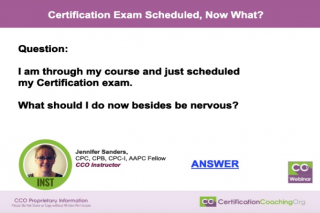 This is something I actually like to teach. I love to do CPC review classes with our local chapter. If you are looking at coming up upon an AAPC exam, look into your local chapter or other chapter surrounding your area and see if they offer CPC review because they really are very helpful. But this is actually something that people just don’t think about actually. They schedule, they go through their courses, they do whatever study it is to get ready for their exam and then they schedule the exam and then what’s next?
This is something I actually like to teach. I love to do CPC review classes with our local chapter. If you are looking at coming up upon an AAPC exam, look into your local chapter or other chapter surrounding your area and see if they offer CPC review because they really are very helpful. But this is actually something that people just don’t think about actually. They schedule, they go through their courses, they do whatever study it is to get ready for their exam and then they schedule the exam and then what’s next?So, typically, congratulations! Getting through everything and scheduling that exam, that’s a big hurdle there and it is a lot of anxiety and nervousness there. So typically you have to schedule that exam at least eight weeks prior because that’s when they’re listed on the AAPC website.
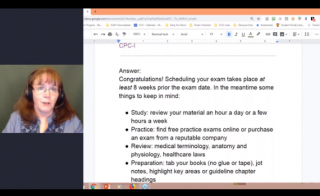 So you have some time in there, what do you do in that mean time? Look at studying. Review that material, go over it again. Review the courses if you still have access to them through CCO, or if you’re AAPC, however you did your studying or through books or handouts through a college. Go through maybe an hour a day or a couple of hours on a Saturday or Sunday or something and just keep it fresh in your mind.
So you have some time in there, what do you do in that mean time? Look at studying. Review that material, go over it again. Review the courses if you still have access to them through CCO, or if you’re AAPC, however you did your studying or through books or handouts through a college. Go through maybe an hour a day or a couple of hours on a Saturday or Sunday or something and just keep it fresh in your mind.
Practice – Find some free exams out there. CCO offers free exams, there are free exams or maybe a book you can buy on Amazon that might offer some exam. Just any of that additional practice that you can get, practice over and over.
Review your medical terminology. Make little flashcards if you need, your anatomy and physiology and even the healthcare laws. Those are going to be on every certification exam that you take. There’s going to be a couple of questions about some of the healthcare laws because they really do affect our business.
Preparation – Tab your books. You’re not allowed to glue or tape any notes or anything in your books so tab them up. The little tabs or little Post-It note tab, anything like that. Brief notes; don’t write paragraphs in your book because you don’t have time to read it. Highlight those areas or in the guidelines, highlight the chapter – chapter 10, chapter 11, chapter 12 – so they pop out at you when you’re looking quickly for your guidelines.
A few weeks prior to your exam, you should receive an email from the chapter that’s giving your exam. If you don’t get one a week beforehand, contact the proctor. You need to know where to go. You need to know the directions. You need to know what time you have to be there, if there’s any special key code you have to enter to get into the building earlier or something like that, so make sure you have all that information.
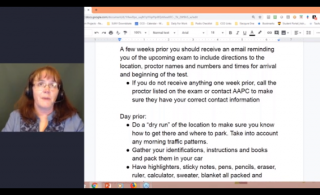 If you didn’t get anything, contact the AAPC to get that proctor’s name and make sure the AAPC actually has your correct email address and phone number because typically all chapters are going to send out an email, so if you have a wrong email address then you’re not getting that information.
If you didn’t get anything, contact the AAPC to get that proctor’s name and make sure the AAPC actually has your correct email address and phone number because typically all chapters are going to send out an email, so if you have a wrong email address then you’re not getting that information.
The day prior, now you’re extra nervous. Don’t know what to do, do a “dry run”. Make sure you know where it is. Make sure if you’re spending the night in another city the night before, then go to the place, make sure you know how to get there, make sure the roads aren’t blocked, some detour. Make sure if there’s morning traffic patterns, that only go one way or some weird thing.
Make sure you have your identification. Your books, your instructions, everything, pack them in your car the day before. When you’re running out of the house because the alarm didn’t go off because the power went out in the middle of the night, you don’t want to think about “Oh my gosh, I forgot my books.” So put them in the car, have them ready for you.
Highlighters, sticky notes, pens, ruler, calculator – a little manual calculator you can get for a dollar at the dollar store. New Apple watches, new Fitbit’s anymore, new phones; so if you have a calculator on your phone, go to the dollar store and buy a little dollar calculator. A sweater, a blanket, you never know if they’re going to have the air turned on to 54 degrees in there; so make sure that you’re prepared with everything that you need.
Do not study the day before. Take a bath, relax, watch a movie, spend time with the family, do something other than study. You want to relax yourself.
HYDRATE! Drink water, drink water that week prior, the day prior, make sure that it helps your mind. It makes those neurons fire quicker, it helps everything when you’re hydrated and you don’t feel funny or bloated or down, so make sure that you’re keeping your food proper and your hydration.
Pack quiet, non-smelly snacks. Sometimes we keep in mind people’s peanut allergies, so maybe not peanut butter but not everybody is allergic but just in case. No bag of chips that you got to crinkle and break them, it can be distracting. Include water. Your proteins, don’t forget the proteins. Some people talk about a little “reward” treat like they pack those Hershey’s Kisses bag and they set them out there. So, after like every ten questions, they’ll have a Hershey’s Kiss or something like that; some little kind of reward, a little pep, a little sugar.
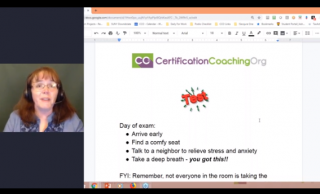 Day of exam – you made it there on time, you got it there, arrived early. Get a comfy seat. If you don’t like being by the window, if you think there’s a chill, or too much sun, find a comfy seat that’s good for you. If you don’t like a lot of people around you, maybe back in the corner. Talk to that person next to you. It will help relieve stress, they’re in the exact same situation you are, they’re nervous too. So it helps get rid of that.
Day of exam – you made it there on time, you got it there, arrived early. Get a comfy seat. If you don’t like being by the window, if you think there’s a chill, or too much sun, find a comfy seat that’s good for you. If you don’t like a lot of people around you, maybe back in the corner. Talk to that person next to you. It will help relieve stress, they’re in the exact same situation you are, they’re nervous too. So it helps get rid of that.
Take a deep breath because you know you can do it. You know this is going to work perfectly. You did all the studying you could do and you’re going to do the best you can do.
Remember some important things, when you get in there and you think “Well, I’m only allowed to have my CPT book, my HCPCS and my ICD-10, why does that person over there get a medical dictionary?” Not everybody is taking that same test. There are multiple certification exams that are offered at one time, so everybody could be coming in for a different test. So, some people are allowed certain references. I took the CPPM, the practice manager, I was allowed nothing, so I didn’t get any book in there. So there are different criteria for each test, so make sure that you don’t feel bad because you didn’t get something that somebody else did.
They actually give you a sheet when you get there for the instructions and on the back it tells you all of the references that those people were able to have or it’s on the AAPC website if you want to check it out before the exam and make sure you have everything that you’re allowed to have.
Write your answers on the grid. I know have got that little picture over there; bubble in, bubble in, bubble in. I proctor a lot of exams and to have to call time and people come up and they hand you this grid and they say, “Where are your answers?” “Well, they’re in the book.” They don’t look at the book; they only look at the grid so make sure you put them on that grid. Then, when they call “time is up” time is up…
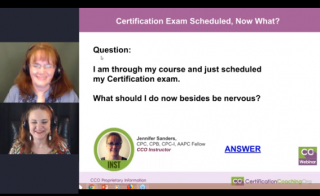 Coach Jennifer: It’s just to make sure that you answer everything on the grid because they will not accept your book if your answers are in the book, it have to be on the grid and it’s really nerve wracking sometimes when people turn in there a blank grid because they don’t have time to go back and do it. I still remember when the call time is up, time is up, you can’t answer any more questions, so just the pencil down.
Coach Jennifer: It’s just to make sure that you answer everything on the grid because they will not accept your book if your answers are in the book, it have to be on the grid and it’s really nerve wracking sometimes when people turn in there a blank grid because they don’t have time to go back and do it. I still remember when the call time is up, time is up, you can’t answer any more questions, so just the pencil down.
Coach Alicia: Another thing that I was thinking when Jennifer was going through all that, if you do decide to get our Blitz, all of the stuff that she told you about is reiterated as part of the Blitz. So, all those great testing tips and things like that, if you need to be reminded, so that’s excellent. You can tell the Blitz was created with people that have tested and proctored a lot.
![[CCO] Certification Coaching Organization LLC [CCO] Certification Coaching Organization LLC](https://www.cco.us/wp-content/uploads/2015/05/CCO-Logo-2015-d3-500px.png)